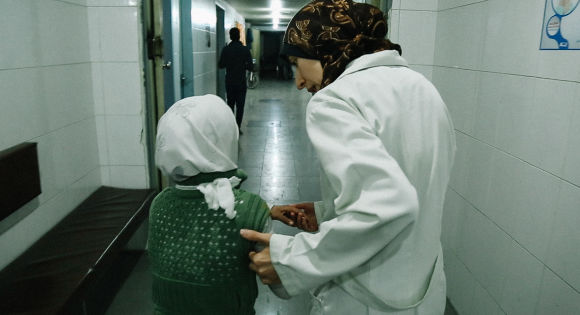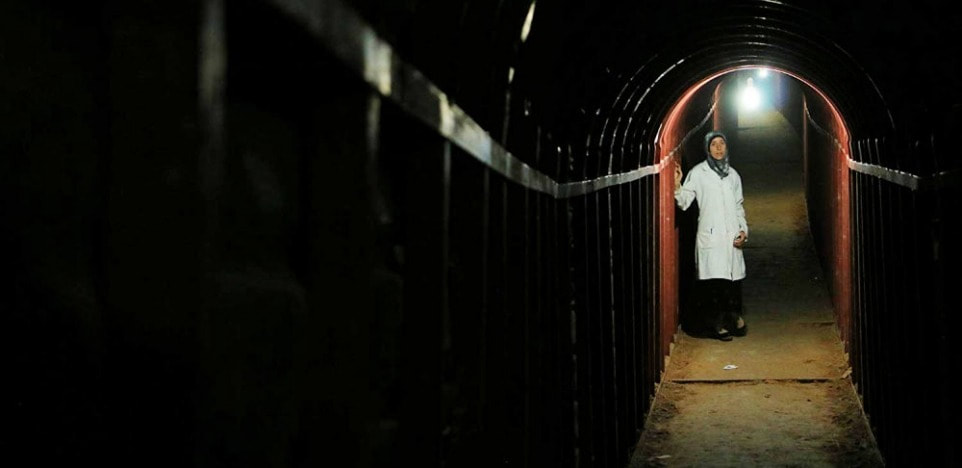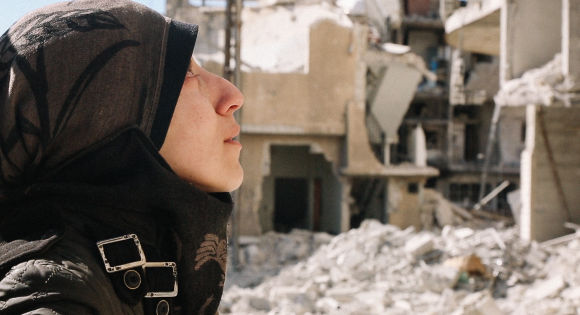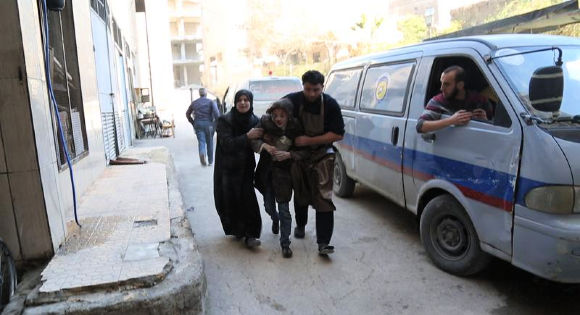The Cave
Directed by Feras Fayyad
An emotionally rich portrait of
an inspiring young doctor
caring for her patients
in the Syrian war.
Reviewed by Frederic and Mary Ann Brussat
reposted from Spirituality and Practice
Some of our favorite films are inspirational documentaries that challenge our resolve to act in spite of fear.
The Cave is a companion piece to Last Men in Aleppo, which focused on two civilian volunteers in the Syrian Civil Defense's White Helmets. These heroes are seen on search-and-rescue missions after barrel bombs are dropped on the city by Russian bombers; the Russians are allies of the regime of Bashar al-Assad.
Civilians are also suffering terribly in The Cave, which takes place in Eastern Al Ghouta, where Russian bombardments have destroyed most of the buildings; schools, markets, and residential neighborhoods have been leveled. Even ambulances and hospitals are targets. The heroine in this film is Dr. Armani Ballour, a 30-year-old pediatrician who has been elected twice as the manager of an underground hospital called The Cave.
Together Last Men in Aleppo and The Cave are two of the most convincing and unflinching antiwar films ever made. There is no place to run and no place to hide for the men, women and children who remain trapped in the cities under attack in the Syrian war. Those who selflessly care for them are under incredible pressure and unbelievable stress.
Director Feras Fayyad, who was at the helm in both films, eschews the talking-heads approach and instead uses three Syrian cinematographers to create an observational, character-driven cinema verité documentary. There are no voice-over comments or direct to camera interviews. The filmmakers take us along as they follow the medical staff, seeing as they do the suffering around them.
Adding to Dr. Ballour's stress are attitudes toward women in this patriarchal society. Unable to obtain the medicine his wife needs, an angry man blames Ballour, declaring that she is not fit for this job and should be at home cooking and taking care of children. Dr. Salim, a male surgeon colleague, stands by her, as does her female colleague, Dr. Alaa. Her righteous indignation comes to the fore when the ponders the many ways the dogmatic religion of these chauvinists has harmed and even killed so many working women like her.
As the bombings by the Russian warplanes increase, Ballour begins to succumb to feelings of hopelessness and helplessness given the deaths of so many children, the lack of medical supplies, the complaints about bad food, and the relentless and the deafening noise of the bombers overhead. She is encouraged to carry on by Samaher, a hard-working nurse who loves to cook and puts together a birthday party for Ballour.
Best of all is the love and encouragement, she receives from her father who says to her: "People will forget the war at some point. But they will never forget you."
And he is right.
We will not forget the kindness of her outstretched hands as she tries to bring momentarily dead children back to life.
We will not forget her sadness when she ventures outside the Cave to visit a family with three malnourished children and no blankets to use during the coming winter; she realizes there is nothing she can do for them.
We will not forget her conversation with a young girl whose father was killed in a car bomb; she listens intently and tries to remind the girl of some normal everyday things.
We will not forget the grief that overtakes her as she sits at her desk or wanders outside to see the devastation of the city.
We will not forget the tears she and Dr. Salim share when they realize there is little they can do for patients brought into the hospital after an attack by chemical weapons.
We will not forget the half-smile on her face as an outward sign of her inner capacities for sharing and caring.
We will not forget her perseverance after she and her colleagues must close down the hospital and leave the city. Headed for a refugee camp, she says: "I'm afraid that what I saw will haunt me forever."
Sadly we feel the same way and pray for the day this savage war will end.
reposted from Spirituality and Practice
Some of our favorite films are inspirational documentaries that challenge our resolve to act in spite of fear.
The Cave is a companion piece to Last Men in Aleppo, which focused on two civilian volunteers in the Syrian Civil Defense's White Helmets. These heroes are seen on search-and-rescue missions after barrel bombs are dropped on the city by Russian bombers; the Russians are allies of the regime of Bashar al-Assad.
Civilians are also suffering terribly in The Cave, which takes place in Eastern Al Ghouta, where Russian bombardments have destroyed most of the buildings; schools, markets, and residential neighborhoods have been leveled. Even ambulances and hospitals are targets. The heroine in this film is Dr. Armani Ballour, a 30-year-old pediatrician who has been elected twice as the manager of an underground hospital called The Cave.
Together Last Men in Aleppo and The Cave are two of the most convincing and unflinching antiwar films ever made. There is no place to run and no place to hide for the men, women and children who remain trapped in the cities under attack in the Syrian war. Those who selflessly care for them are under incredible pressure and unbelievable stress.
Director Feras Fayyad, who was at the helm in both films, eschews the talking-heads approach and instead uses three Syrian cinematographers to create an observational, character-driven cinema verité documentary. There are no voice-over comments or direct to camera interviews. The filmmakers take us along as they follow the medical staff, seeing as they do the suffering around them.
Adding to Dr. Ballour's stress are attitudes toward women in this patriarchal society. Unable to obtain the medicine his wife needs, an angry man blames Ballour, declaring that she is not fit for this job and should be at home cooking and taking care of children. Dr. Salim, a male surgeon colleague, stands by her, as does her female colleague, Dr. Alaa. Her righteous indignation comes to the fore when the ponders the many ways the dogmatic religion of these chauvinists has harmed and even killed so many working women like her.
As the bombings by the Russian warplanes increase, Ballour begins to succumb to feelings of hopelessness and helplessness given the deaths of so many children, the lack of medical supplies, the complaints about bad food, and the relentless and the deafening noise of the bombers overhead. She is encouraged to carry on by Samaher, a hard-working nurse who loves to cook and puts together a birthday party for Ballour.
Best of all is the love and encouragement, she receives from her father who says to her: "People will forget the war at some point. But they will never forget you."
And he is right.
We will not forget the kindness of her outstretched hands as she tries to bring momentarily dead children back to life.
We will not forget her sadness when she ventures outside the Cave to visit a family with three malnourished children and no blankets to use during the coming winter; she realizes there is nothing she can do for them.
We will not forget her conversation with a young girl whose father was killed in a car bomb; she listens intently and tries to remind the girl of some normal everyday things.
We will not forget the grief that overtakes her as she sits at her desk or wanders outside to see the devastation of the city.
We will not forget the tears she and Dr. Salim share when they realize there is little they can do for patients brought into the hospital after an attack by chemical weapons.
We will not forget the half-smile on her face as an outward sign of her inner capacities for sharing and caring.
We will not forget her perseverance after she and her colleagues must close down the hospital and leave the city. Headed for a refugee camp, she says: "I'm afraid that what I saw will haunt me forever."
Sadly we feel the same way and pray for the day this savage war will end.



